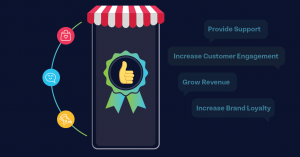
Omnichannel vs multichannel
New technology is constantly pushing marketers to form new marketing strategies. These strategies give birth to fresh terminology that marketers need to become familiar with. And two terms are currently battling it out for supremacy. It’s omnichannel vs multi-channel marketing and the debate is as hot as ever. Let’s take a look at how these terms differ and what you as a business owner can learn from them.
Omnichannel vs multi-channel: How the war began
In the good old days, if a consumer wanted to buy a television, they’d go to a local department store, view the options, choose which model they liked best, and buy it. As the world got faster and tech evolved, their decision became informed by other factors: word-of-mouth or through reading a consumer report (a print publication that offers reviews on different products). Then came the internet and suddenly consumers are being exposed to a bunch more factors. They were no longer reliant on local businesses to meet their needs. The internet allowed them to browse, research, and purchase online.
But things didn’t stop there. Marketing trends have changed; tech developed further. We developed laptops, tablets, and smartphones. Now the consumer has even more options to satisfy their shopping needs. They might choose to shop in-store, or they might shop from their desktop or from an online catalog. They might learn about a new product in an email or through a social media post, then visit the website to learn more, and talk to their friends about whether the product was worthwhile before purchasing it on their smartphone. The options are endless.
More options have given marketers more opportunities to connect and engage with their markets. But with has brought greater complexity and marketers are struggling to keep the interactions consistent across all the channels. It’s the challenge of multi-channel marketing: It looks more like a spider web than a racetrack.
It’s easy to see why this battle of omnichannel vs multi-channel started. Marketers needed to respond to the spider web because consumers were getting tangled up. Enter omnichannel marketing. This refers to a multi-channel approach that provides a sleek, unified, and consistent experience. The customer can be shopping online from a desktop or mobile device, or in a brick-and-mortar store, and the experience will be the same. In fact, in an omnichannel environment, the consumer would be able to interact with the brand online and pick up where they left off in the brick-and-mortar store.
The channel or the customer?
The multi-channel approach looks to blast messages out via as many channels as possible. It focuses on quantity rather than the quality of the message. Omnichannel marketing also has messages cast out of many different channels, but doesn’t compromise on quality for the sake of quantity – the experience across every channel must be the same, and the customer must be able to pick up where they left off – no matter which channel they’re using to interact with the brand. This is a lot more focused on the customer. If the experience is the same, the customer is more likely to enjoy the process.
Engagement or consistency?
While engagement is important, business owners can’t build loyalty from it. In fact, if the experience is designed solely for the purpose of engagement, the customer is likely to see through it and it may result in a negative brand association. Consistency, on the other hand, creates security and trust and is more likely to result in a positive brand association.
Effort or ease?
The omnichannel vs multi-channel war takes another turn when it comes to how difficult the customer finds engaging with the brand. Multi-channel marketing tends to make life a little more complicated for customers looking to make a purchase. This channel says one thing, that channel says another: which is true? The result is confusion and probably an abandoned shopping cart. Omnichannel takes the stress out of this and puts the customer at ease.
Even though both strategies focus on the use of multiple channels to reach customers and make sales, one is more effective. Omnichannel seems to be an evolution of the multi-channel strategy and, until a new strategy is developed, it is perhaps a more effective way of reaching consumers. If you’d like to learn more about omnichannel marketing, read our article that outlines the strategy’s effectiveness in retail.
Explore other articles
Step into the future of business messaging.
SMS and two-way channels, automation, call center integration, payments - do it all with Clickatell's Chat Commerce platform.








